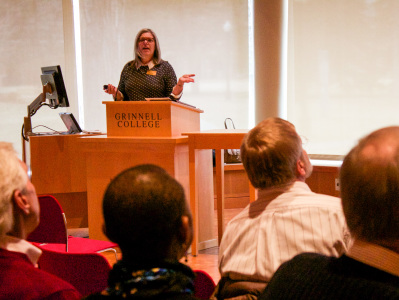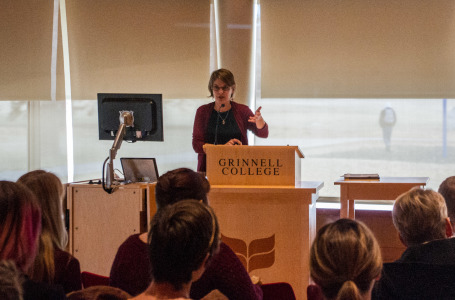On Tuesday, Dec. 9 and Thursday, Dec. 11 at noon, members from various offices of Grinnell College hosted two Inside Grinnell sessions, focused on international students and the utilities of the College’s endowment, respectively. Both sessions were well attended as presenters outlined the challenges and achievements they’ve encountered in their respective fields.
Regarding the Grinnell experience for international students, Karen Edwards, Associate Dean and Director of International Student Affairs, surveyed the various aspects of coming to Grinnell from another country. She noted the significant increase in the number of students from countries such as China and Vietnam, the College’s efforts to celebrate religious, cultural and regional identities and the challenges that students often face being so far from home.

Photo by Sarah Ruiz.
“We want to welcome and celebrate the national and regional identities of our international students, which can vary much more than people often realize,” Edwards said. “We focus on recognizing diversity within a group that can appear homogenous on the surface.”
Edwards noted that although adjusting from big cities to a small Iowa town has been very hard for some students, international students overall reported similar if not slightly higher rates of satisfaction with their time spent at Grinnell compared with domestic students, as measured through the Noel Levitz Student Satisfaction Inventory.
Edwards also covered the socioeconomic status (as determined by expected family contributions) of the international student body, which are admitted on a need-aware basis at a given target rate. She explained how the College’s International Pre-Orientation Program (IPOP) helps students learn about their immigration status, meet others with similar transition experiences and get in contact with their host families and IPOP leaders.
“It’s always exciting to hear their stories about interacting with their host families,” Edwards said.
The presentation ended with a montage of international students participating at different events while clearly enjoying themselves.
“I filled my last slides with faces. This is what makes my work meaningful, this is what brings joy into our lives,” Edwards said.
During the second Inside Grinnell session, Chief Investment Officer Scott Wilson and Vice President for Finance and Treasurer of the College Kate Walker reviewed the current status of Grinnell College’s endowment and subsequent financial plans moving forward.
Wilson began by outlining the growth that the College’s endowment has experienced. He noted that when he first came to Grinnell in 1994, the endowment was only $400 million, and now sits at approximately $1.8 billion. He attributed Grinnell’s investment success largely to the careful management of the endowment under Joe Rosenfield ’25, who oversaw the growth of the endowment for decades until his death and was quoted by former trustee Gardiner Dutton as saying, “Our job is to make this institution financially impregnable.”
“Joe’s philosophy was always be patient and invest for a reason,” Wilson noted.
Wilson also highlighted Rosenfield’s famous investment in Intel and the purchase of an Ohio radio station as suggested by famed former trustee Warren Buffett as keys to expanding Grinnell’s sizeable endowment. He proceeded to explain how the Office of Investments has diversified its investment portfolio and has focused on procuring a socially responsible investment profile, as stated in the Grinnell College Investment Policy.
“Our mission statement reads: ‘The Investment Committee recognizes the importance of socially responsible decisions to the long-term financial performance of business enterprises, and it selects investments and investment managers whose conduct is consistent with the core values of the College,’ and we strive to fulfill those goals,” Wilson said.
After an overview of the endowment’s asset allocation, Wilson explained that the endowment is invested to ensure long-term growth with the hope that there will be inter-generational equity and the opportunity to preserve or enhance the endowment’s real purchasing power.
“We’re very value-centric or price-centric investors,” Wilson said.
He added that Grinnell’s endowment has had some of the highest returns among colleges around the country, often leading the industry average by significant margins. However, Wilson cautioned that spending of this financial success must be managed carefully, given the significant percentage of the operating budget to which the endowment contributes. He noted that Grinnell’s net tuition is much lower than the average of peer institutions and that the College’s gift rate is at a lower percentage as well.
“Our spending policy is four percent of the trailing 12-quarter moving average [of our endowment], which is there to smooth out ebbs and flows,” he said.
Walker pointed out that the full four percent cannot be used in the operating budget, and that revenue from the endowment represents 55 percent of Grinnell’s revenue profile—approximately $110 million this academic year—which is very high compared to similar schools.
Walker added that Grinnell College might have been the first college in the country to have an AAA credit rating, the highest rating, which is often used as a measure of financial health. As a result of this rating, the College has the ability to borrow with relatively low interest rates, which will be utilized for significant amounts of upcoming construction and other projects.
“We will also take on new debt for ARH and Carnegie interest payments,” Walker said. “As far as institutional infrastructure goes, a lot of old buildings need a lot of work, and we don’t have this reserve right now. We need a 25 to 30 million-dollar reserve for this purpose.”
As mentioned during a previous listening session with President Raynard Kington, Grinnell is seeking to build philanthropic report through investment and economic development in the town, which will be classified under the community infrastructure budget.
“This is something we can do, and something we can do very well. Hopefully, we will set a standard for the industry,” Walker said.




















































